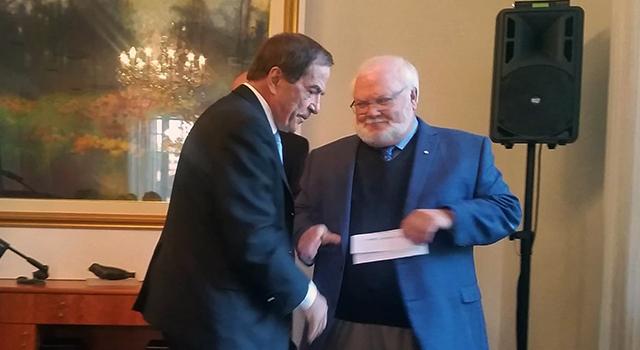Czech Republic: Canadian education expert says only an inclusive school is a really good school

"Good teachers who get enough support can achieve even better results with their pupils than special educators in special schools can," said Gordon Porter, a leading expert on inclusive education, during an event on 16 May at the Canadian Embassy in Prague. Porter was invited to the Czech Republic by Open Society Fund Prague to share his many years of experience with inclusion in Canada.
According to Porter, one result of 30 years of advocacy for inclusive education, which was begun in Canada by parents themselves, is the fact that in the state of New Brunswick, for example, all children, irrespective of disability, are educated at their local community school. "Only an inclusive school is a really good school," he told the audience.
"Multiculturalism is making Canada stronger," Canadian Ambassador Otto Jelinek reminded the audience when opening the meeting. He himself has long supported inclusion and Porter expressed appreciation for his activities.
Czech Human Rights Minister Jiří Dienstbier emphasized in his remarks that according to international conventions, every child has the right to a quality education. That means inclusion is an obligation for the Czech Republic.
"In an inclusive school children learn that each one of them is different, and once all children comprehend that at an early age, the entire society, and the quality of life, will be better for all of us," the minister said. Deputy Education Minister Stanislav Štech told those assembled that inclusion is a trend that has run through the entire 20th century and that history has demonstrated it is possible, even though not for absolutely everyone and not under any and every circumstance.
Štech said he believes the ideal implementation of inclusion does not actually exist but that it is about changing minds and is a long-term process. Porter warned, however, that the implementation of inclusion should not take longer than between three and five years.
"If it takes longer than that, it is possible that it will never be realized. The political representation might change and have different priorities," he said.
The Canadian expert also emphasized the need to stick to one idea and not stop activities once they are underway. Among some participants in the meeting, however, there were concerns about the degree to which his experiences were applicable, for example, when it comes to educating Romani children together with everyone else in Czech society, where anti-Gypsyism is so strongly rooted.
Porter commented on that issue as follows: "Every country must create its own functional model, but when we share our experiences, we will all be successful." He emphasized, however, that not every battle will be won and that it is possible to establish small-scale aims and promote positive examples.
"Choose 10 schools where it works, turn them into role models for everybody else, then find the next 10, etc., until most of the schools are role models, and even the most bitter opponent of inclusion will have no choice but to join the club," Porter said. He also explained that he, too, had not been convinced in the very beginning that educating all pupils together is the only correct way.
Porter said he had always been curious to know what a special educator knew how to do that he, as a regular educator, did not. His final decision that something had to change in the field of educating children with disabilities came through an experience with his own 12-year-old son: "I asked him once to take a letter to the principal of a school for children with disabilities – I was chairing its board – but my son wouldn’t do it because he didn’t want his friends to see him anywhere near that school. It was at that moment that I realized I had to do something."
For his service in the field of education Porter has been awarded many honors – in 2010, he was given the Order of Canada, that country’s highest state honor, and in 2013 he received the Order of New Brunswick. In 2012 he was awarded a medal by Queen Elizabeth II.
Porter has more than 25 years of experience with inclusive education reform, and for the past 15 years he has worked in more than 40 countries around the world. Those interested in learning more about his experiences and knowledge will be able to hear him speak at the Eduspace Education Festival in Brno at the end of this week.